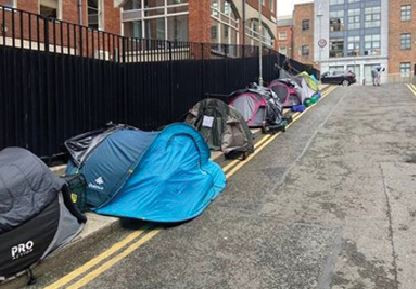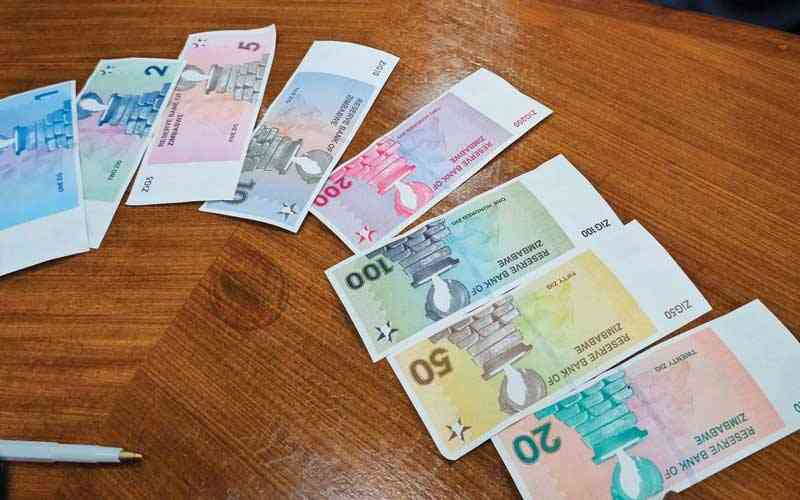
BELFAST — “They have to protect me, housing is a need,” says Erick Nkomazana, a homeless international protection (IP) applicant.
Originally from Zimbabwe, he has been sleeping rough since arriving in Ireland one month ago. He says being provided with shelter ought to be “a basic thing”.
“How many people are they taking in?” he asks. “Even if you see them taking one person, it makes a difference. If you live in fear, you cannot perform at your best.”
As of last Friday, Nkomazana was one of 557 homeless asylum seekers in Ireland. This number has doubled since early March.
The EU’s reception conditions directive says that member states should provide “particular attention to vulnerable persons, especially unaccompanied minors and victims of torture”.
Non-governmental organisations (NGOs) and migrant advocacy groups have criticised the government for failing to meet its legal obligations to protect asylum seekers, particularly vulnerable ones.
In a letter seen by The Irish Times, the Irish Refugee Council asked a number of government departments which identified vulnerabilities meet the threshold of warranting the provision of accommodation to IP applicants, and how these are assessed.
The High Court last month found that Roderic minister O’Gorman’s failure to provide “material reception conditions” to a minor Afghan asylum seeker left homeless when he arrived in Ireland was unlawful.
- It’s hard sleeping outside, say Zim asylum seekers
Keep Reading
Nkomazana says he came to Ireland to flee torture in his native Zimbabwe, meaning he too is considered vulnerable under the EU directive.
Before leaving his home country, he says he spent a week in a prison cell and was beaten daily. He still walks with a limp and points out visible damage to his knee, which he says is a result of these assaults.
Alongside dozens of others, Nkomazana sleeps in a tent outside the International Protection Office (IPO) in Dublin.
He says the recent High Court decision in relation to the Afghan minor offers him and other IP applicants hope that they may be housed soon.
John Lannon, chief executive of Doras, an NGO supporting migrants, says the category of particularly vulnerable refugees extends beyond minors and victims of torture.
“A vulnerable person includes a reference to a person who is a minor, an unaccompanied minor, a person with a disability, an elderly person, a pregnant woman, a single parent of a minor, a victim of human trafficking, a person with a serious illness, a person with a mental disorder, and a person who has been subjected to torture, rape or other form of serious psychological, physical or sexual violence,” he says.
“Without a proper initial assessment of an international protection applicant’s vulnerabilities, we now have situations where people meeting some of these criteria are forced to survive on the streets because the State has not provided them with accommodation. This puts them at risk.”
All of the asylum seekers The Irish Times spoke to said that, either through their own research or word of mouth from others who have come here, they believed Ireland would be a safer place for them than their home countries.
Despite finding themselves homeless here, most believe it is preferable to the situation that caused them to flee to Ireland.
“It’s better than being in the hands of people who want to kill you,” says Joseph*, who fears persecution in his native Malawi due to his sexuality.
Most of those interviewed say they do not tell their families that they are homeless in Ireland for fear of causing further stress back home.
Only a few months ago, it was not the case that refugees arriving found themselves immediately homeless.
Ait Ouyakoub Mohand Ouamar arrived from Algeria last November. He spent one night in the Citywest Transit Hub before being transferred to the accommodation where he still lives today.
“I am very lucky,” says Ouamar, who now volunteers at The Lighthouse soup kitchen for the charity Tiglin, where he interacts with homeless IP applicants. “Two or three months later, the situation changes drastically.”
“In the last two months, numbers [using Lighthouse] have increased,” says Aubrey McCarthy, chair of Lighthouse.
“I’m noticing people from countries we wouldn’t have dealt with regularly — Nigeria, Zimbabwe, Senegal, Moldova. You’re dealing with areas that aren’t the usual cohort that come in here.
“Last week, we had people come in who were sent to us from the airport. They got off the plane and the guards sent them here for accommodation. We’re full up, so all we can do is give food or sleeping bags.
“I know we’re in breach of our obligations as a nation. I know that’s being challenged, but that takes a while to challenge. In the meantime, people are still going to be coming off planes and they’re not coming here to live on the streets as an alternative. They’re thinking there is an opportunity and there isn’t one. Whatever they’re fleeing is worse than what they’re getting here.”
In a statement, the Department of Children, Equality, Disability, Integration and Youth said a number of “complex projects” were under way in an effort to free up more bed space for IP applicants.
The department said these are “subject to planning and building control regulations that can prolong delivery”.
The department said it was accommodating more than 83,000 people (including Ukrainian refugees), compared with 7 500 in February of last year.
*Names have been changed to protect identities










